Expert Recap and Analysis of Halkbank Oral Argument at the Supreme Court
Editor’s Note: This article also appears in Just Security. On January 17, the Supreme Court heard oral argument in Türkiye Halk Bankasi A.S. (Halkbank) v. United States. The case asks whether Halkbank, which is majority-owned by the Turkish Wealth Fund (TWF), enjoys immunity from criminal prosecution in U.S. courts. Last spring, I previewed the unresolved…
Continue ReadingSupreme Court Grants Cert to Resolve Split Over Extraterritoriality of Civil RICO
Earlier today, the Supreme Court granted cert in Yegiazaryan v. Smagin and CMB Monaco v. Smagin and consolidated the cases for oral argument. The question in both cases is how RICO’s private right of action applies to intangible property, in this case a California judgment confirming a foreign arbitral award. As I previously noted on…
Continue ReadingSupreme Court Denies Cert in More Transnational Litigation Cases
On Monday, I reported that the Supreme Court denied cert in NSO Group Technologies Ltd. v. WhatsApp Inc., letting stand a Ninth Circuit decision that companies that work for foreign governments cannot claim immunity from suit under federal common law. Monday’s orders list also denied cert in two other cases that TLB has been following. First,…
Continue ReadingStare Decisis and Extraterritoriality
In a recent post, Curt Bradley suggested that the hardest problem the Supreme Court faces as it revisits the geographic scope of the Lanham (Trademark) Act in Abitron Austria GmbH v. Hetronic International, Inc. is what to do about existing precedent. In Steele v. Bulova Watch Co. (1952), the Court held that the Act applies to…
Continue ReadingSupreme Court Denies Cert in NSO v. WhatsApp
Today, the Supreme Court denied cert in NSO Group Technologies Ltd. v. WhatsApp Inc. The order lets stand a Ninth Circuit decision holding that entities that do not meet the Foreign Sovereign Immunities Act’s (FSIA) definition of an “agency or instrumentality” of a foreign state cannot claim immunity under federal common law. (Disclosure: I joined an amicus brief…
Continue ReadingResolving the Immunity Issues in Halkbank
The question now before the U.S. Supreme Court in Türkiye Halk Bankasi A.Ş., v. United States is whether a foreign state’s wholly-owned private bank is immune from criminal prosecution in U.S. courts. The issue is framed as one of statutory interpretation, since the Second Circuit affirmed District Judge Berman’s ruling that the 1976 Foreign Sovereign…
Continue ReadingSupreme Court to Revisit Extraterritorial Scope of Trademark Law
On March 1, the Supreme Court will hear argument in Abitron Austria GmbH v. Hetronic International, Inc., which concerns the extraterritorial scope of the Lanham (Trademark) Act. In resolving this case, the Court will need to decide what to do about an old precedent that appears to be inconsistent with the Court’s modern approach to…
Continue ReadingSolicitor General Recommends Denial of Cert in NSO v. WhatsApp
On November 21, the Solicitor General (SG) filed a brief recommending that the Supreme Court deny cert in NSO Group Technologies Ltd. v. WhatsApp Inc. NSO, an Israeli company that makes surveillance technology, claims that it is entitled to immunity from suit under federal common law because it acted as the agent of foreign states….
Continue ReadingRecapping Media Coverage of Mallory
Last Tuesday, the Supreme Court heard oral arguments in Mallory v. Norfolk Southern Railway Co., a personal jurisdiction case on review from the Pennsylvania Supreme Court. Robert Mallory, a Virginia resident employed in Virginia and Ohio, sued Norfolk Southern, then based and incorporated in Virginia, in Pennsylvania state court. The case asks the Supreme Court…
Continue ReadingOral Argument on Personal Jurisdiction Today
The Supreme Court will hear oral argument today in Mallory v. Norfolk Southern Railway, a personal jurisdiction case in which the defendant “consented” to general jurisdiction in Pennsylvania based on a corporate registration statute. Although Mallory itself involves no transnational facts, the case could have important implications for foreign defendants. Pennsylvania’s registration and long-arm statutes,…
Continue Reading







